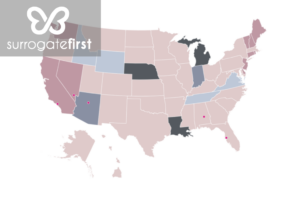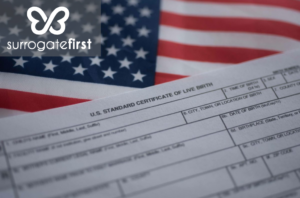If you’re wondering if surrogacy is legal in New York, there’s an essential change to surrogacy laws that may affect you and your partner’s eligibility to participate in gestational surrogacy.

For far too long, New York’s laws against gestational surrogacy have stymied dreams of raising a happy family. Whether or not it’s a traditional family unit or a same-sex couple, the law banned you from all forms of compensated gestational surrogacy across the state.
This unfortunate catch-22 meant that intended parents had no other option but to travel far away to find a surrogate-friendly state. At best, it used to take much longer than the 37 to 42 weeks it takes to birth a child, and that’s not including the time it takes to finalize the surrogacy contract itself.
But as of February 2021, the law changed and gestational surrogacy in New York is finally legal!
In New York, you can use a gestational surrogate provided that the contract adheres to all stipulations in the Child-Parent Security Act, passed into legislation in early 2020.
As you might expect, it’s challenging for most people to unpack all the legal jargon, so this post aims to give a concise, helpful breakdown of the most critical information.
Here’s what you need to know about surrogacy in New York moving forward.
How does the Child-Parent Security Act legalize surrogacy in New York?
If you live in New York and have pursued surrogacy, you already know that you don’t have many options at your disposal. Before the passing of the Child-Parent Security Act, there was no legal avenue to secure and enforce a surrogacy contract, thus making it illegal in the state.
Take a moment to look over what the Child-Parent Security Act does and doesn’t do for surrogates and intended parents:
- Sets legal criteria for surrogacy contracts in full
- Specifies a Surrogates’ Bill of Rights for the first time
- Establishes a defined proceeding for legally assigning parentage after the birth
Let’s take a closer look at each facet of the legislation to understand the new law better.
Requirements for surrogacy in New York
Most importantly, there’s a residency requirement in the law.
This requirement may seem elementary, but it’s a common problem requiring a proactive, forward solution. Non-resident surrogacy arrangements have caused legal difficulties in other states when questions about parentage arise.
Thankfully, New York law now specifies that surrogacy is legal for those who’ve lived in the state for at least six months. The good news is that only one partner needs to be a legal resident to qualify, but it’s preferable if both intended parents live in New York.
What is the Surrogates’ Bill of Rights?
New York is now the first state to require that surrogacy agencies carry licenses. If you’re considering surrogacy in New York, the Surrogates’ Bill of Rights protects your physical, mental, and financial well-being.
Surrogates in New York have the right to:
- Choose their own health care provider
- Make their own decisions about their physical welfare during pregnancy
- Receive compensation
- An independent counsel, paid for by the intended parents
- Receive mental health counseling if needed
- A life insurance policy that extends up to a year after the birth
- Cancel the arrangement
- Terminate the pregnancy
You might also be wondering how this policy shift affects the cost of surrogacy too.
Does health insurance have to cover surrogate costs in New York?
Without a doubt, the cost of surrogacy is prohibitive for many couples who can’t start a family due to medical, biological, or legal hurdles. One of the best parts of the Child-Parent Security Act is that it directs the Department of Financial Services the regulatory arm of New York’s insurance industry not to discriminate against surrogate pregnancies.
Previously, a same-sex couple would have to pay six to 12 months’ worth of expenses even to begin the process. Also, insurance law made it impossible for the intended parents’ health coverage to include a surrogate’s medical care.
Today, health insurance is guaranteed for surrogates in New York!
What does this change mean for intended parents?
It’s fantastic news that intended parents also have new rights codified by law. The biggest win for intended parents under the Child-Parent Security Act is that they won’t have to fight for custody of the child, as in other states with suspect parentage laws.
New York law now specifies parentage based on consent and intent, not necessarily marital, biological, or legal status. It may not look like it at a glance, but this change also legalizes surrogacy for same-sex couples in a unique way.
How does the Child-Parent Security Act protect the LGBTQ community’s rights?
In year’s past, fertility services for same-sex couples have been banned outright in some stateseven if the facility was qualified. The situation was particularly problematic from a health insurance perspective.
But the Child-Parent Security Act specifies that insurance companies cannot deny fertility services based on the sexual orientation of the couple. That’s a new trend, and moving forward, it’ll be interesting to see how many other states follow New York’s example.
Indeed, surrogacy is legal now in New York, so you don’t have to worry about traveling out-of-state to find a surrogate.
About SurrogateFirst
At SurrogateFirst, we’re a boutique surrogate agency specializing in quickly matching intended parents around the world with our fully-vetted, exceptional surrogates.
We help individuals and couples, regardless of race or sexual orientation, build their families through the miracle of surrogacy.
Every team member at SurrogateFirst is either a former intended parent or an experienced surrogate herself. We also have first-hand knowledge of what it takes to have an incredible, successful surrogate journey.





